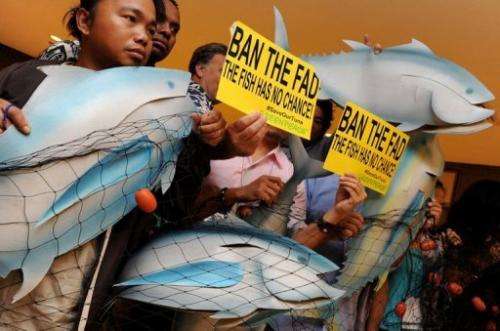Fish luring devices divide Asia-Pacific tuna meet

Tuna-harvesting nations of the Pacific argued at a key meeting in Manila Tuesday over how best to regulate devices that attract the giant fish, amid growing concern over depleted stocks, officials said.
A call to extend an annual ban on fish aggregating devices (FADs) to four months was among the most contentious issues at the Western and Central Pacific Fisheries Commission meeting.
An annual July-September ban on FADS is already in place in waters that account for half the world's tuna catch, and a four-month ban would hurt small Pacific nations the most, said Palau fishing official Nanette Malsol.
"We don't want to put any disproportionate burden on smaller countries," said Malsol, who chairs Parties to the Nauru Agreement (PAN), a coalition of small Pacific island nations.
She said her group opposes the extension of the so-called "closed period" unless smaller nations are compensated.
FADS are made of buoys tethered to the ocean floor. They can attract huge numbers of fish, allowing boats to haul them in quickly rather than spending time and fuel searching for schools of tuna.
Critics say fishing with FADS means juvenile fish are snared, as well as bycatch that includes threatened species like sharks, rays and sea turtles.
About a dozen Greenpeace delegates staged a protest at the venue, calling for a total FADS ban to allow tuna stocks to recover.
"FADS must be banned if we want to see our tuna stocks survive," the environmental campaign group's delegation head Lagi Toribau said.
"Not only does it contribute to the rapid decline of fish stocks, it also results in a large amount of unwanted bycatch."
Other delegates told AFP none of the 30 member-nations and territories attending, including the US, China, Japan and Australia, favoured a total FADS ban but many of them recognised the need to limit their use.
However, they said they disagreed on how this should be done.
Malsol said the American delegation opposed compensation for smaller nations.
US-based Pew Environment Group, which also sent delegates to the meeting, estimates between 47,000 and 105,000 FADS are in use worldwide.
The International Union for Conservation of Nature (IUCN) has previously warned that global tuna stocks are fast reaching the limits of sustainability due to a lack of comprehensive catch-limits.
(c) 2012 AFP


















